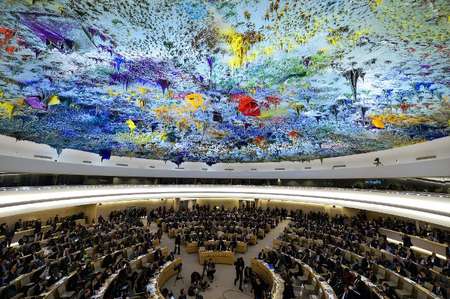Israel tells UN it's not responsible for human rights in oPt

The United Nations Human Rights Council in session, on February 25, 2013 in Geneva. Photo by
Fabrice Coffrini/ AFP
U.N. questions Israel on Palestinians’ rights
By Reuters
October 21, 2014
Geneva–U.N. experts questioned Israeli officials on Monday over alleged rights abuses ranging from the demolition of Palestinian houses and the expansion of Jewish settlements to limited Palestinian access to water and their farmland.
Israel’s delegation defended its record before the United Nations Human Rights Committee, which examined respect for civil and political rights in Israel, the Gaza Strip and the West Bank. Each U.N. member state is reviewed every four years.
However, the government only provided written information about Israel as it says its obligations to report to the committee do not extend to Palestinian territories – something the U.N. panel and International Court of Justice disagree with.
Committee chairman Nigel Rodley voiced frustration at Israel’s interpretation of the pact in the report that provided the starting point for the committee’s questioning but failed to address some of the Palestinians’ main grievances, such as the building of homes on territory they want for a future state.
“I did indicate that the settlements are at the heart of many problems that are faced, including alleged violations of the right to life and freedom of movement and so on,” Rodley told Reuters Television.
The committee was meeting just months after the latest Gaza conflict – an inconclusive war that killed more than 2,100 Palestinians, most of them civilians, along with 67 Israeli soldiers and six civilians in Israel.
Israeli Ambassador Eviator Manor said the Jewish state was forced to launch the air strikes after Hamas militants fired 300 rockets and kidnapped three Israeli teenagers, later found dead.
Demolition concern
Panel member Cornelis Flinterman, recalling that it had called on Israel in 2010 to halt construction of settlements, said that it had information that the number of settlements had doubled since.
“It seemed that no attention had been given whatsoever to our earlier recommendation,” he told Reuters Television.
Palestinians have difficulty accessing their own farm lands, Flinterman said. “Quite often they are intimidated by the settlers coming to live in the new settlements. They are more or less you could say treated as foreigners in their own country.”
Successive Israeli governments have said the settlement blocs, deemed illegal under international law, should remain part of Israel in any negotiated deal with the Palestinians.
Yuji Iwasawa, a panel expert from Japan, said the resumption of a policy of punitive demolition of houses was a concern.
“We have reports of Palestinians and Bedouins compelled to give consent to demolition in a coercive environment as a result of (Jewish) settlers’ harassment and violence.”
Colonel Noam Neuman, head of the Israeli army’s international law department, said in response that since 2013 there had been an increasing number of militant actions in Israel and the West Bank.
“Israel’s policy of using house demolition for the purpose of deterrence is implemented only in exceptional circumstances,”
he said.
The U.N. panel also questioned the seizure of West Bank land by the Israeli army and called for Palestinians in detention to be given prompt access to a lawyer and independent medical examination before being brought before a judge.
Emi Palmor, director-general of Israel’s Justice Ministry who led the 13-member delegation, said that Israel had made progress in upholding human rights but “more needs to be done”.
The committee’s conclusions are to be issued on Oct. 30.
